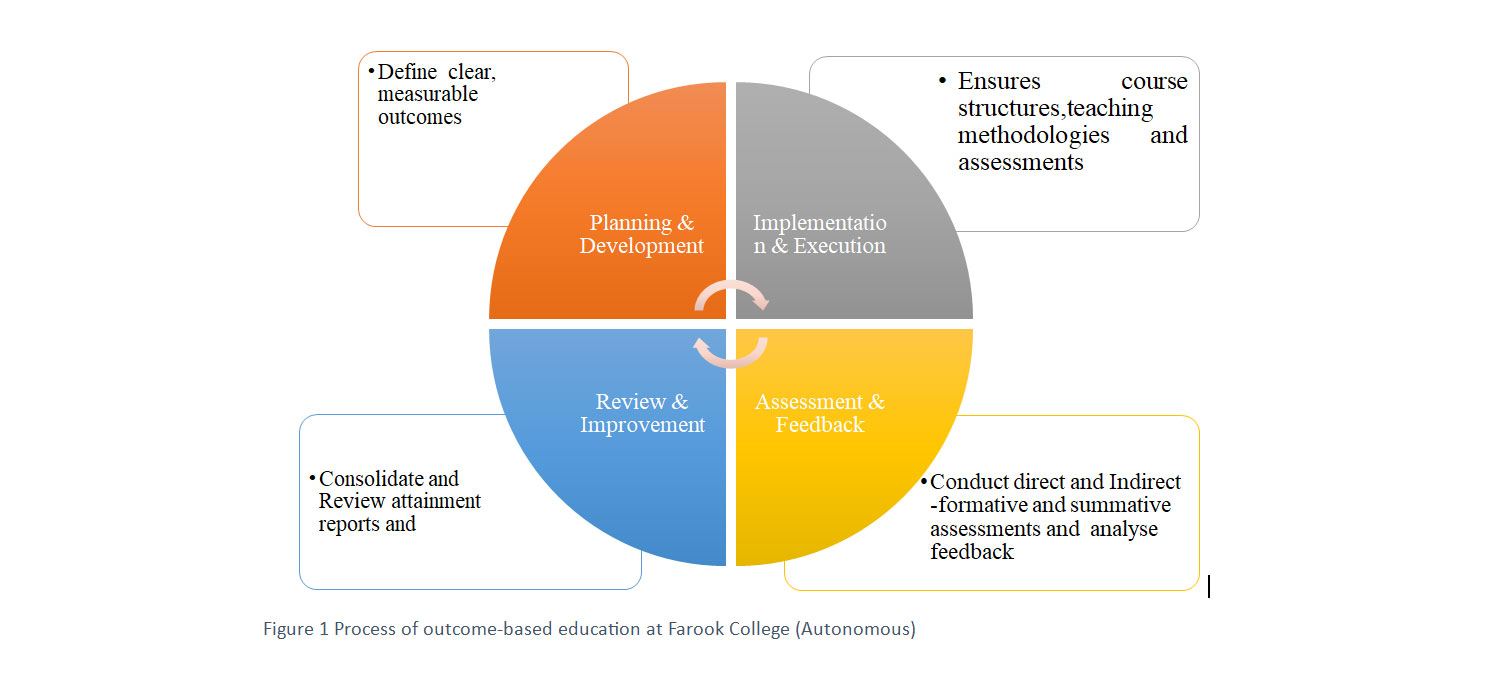Farook College (Autonomous) is committed to preparing students for meaningful and impactful careers through our robust Outcome-Based Education (OBE) framework. This education approach focuses on equipping students with well-defined skills, knowledge, and competencies that align with the demands of today’s professional landscape and societal needs.
Significance of Outcome-Based Education (OBE)
OBE ensures that every program, course, and learning experience at Farook College is purpose-driven. Our goal is to achieve clear, measurable learning outcomes, ensuring that our graduates possess the competencies necessary to excel in their fields. This focus empowers students to take control of their learning journey, as they progress through skill-based, industry-relevant content that fosters critical thinking, problem-solving, and innovation.
Our OBE System
The institution has established a comprehensive OBE system, integrating Programme Outcomes (POs) and Course Outcomes (COs) that outline specific learning objectives for each program and course. Our outcomes are developed through regular consultation with industry experts, alumni, and academic bodies, ensuring that they meet evolving professional standards. Each course is structured to enable students to demonstrate these outcomes through real-world applications, projects, and assessments. At Farook College (Autonomous) OBE system is strategically designed and overseen by dedicated bodies, ensuring a seamless cycle of planning, implementation, execution, and review. This structured approach upholds the quality and alignment of our learning outcomes across all programs and courses.
Key Components of the OBE System:
- Internal Quality Assurance Cell (IQAC): The IQAC plays a pivotal role in setting and maintaining OBE standards across the institution. It coordinates with various departments, guiding the design of Programme Outcomes (POs) and Course Outcomes (COs) that reflect industry standards and emerging competencies. The IQAC also oversees the collection and analysis of attainment data, enabling continuous improvement.
- OBE Implementation Committee: This central committee is responsible for the overall planning, monitoring, and execution of the OBE framework. It collaborates closely with the IQAC and Quality Learning Cells to establish clear timelines, evaluation mechanisms, and feedback processes for outcome assessment.
- Quality Learning Cells (Department-Level): Each department has a dedicated Quality Learning Cell that ensures OBE principles are implemented within courses. These cells work directly with faculty to define course-specific outcomes, align teaching methods with OBE goals, and conduct regular assessments. They also compile departmental attainment reports, which are submitted to the OBE Implementation Committee and IQAC for review.
 Programme Outcomes
Programme Outcomes
| Sl. No. |
Programme |
POs |
| 1 |
BA |
PDF |
| 2 |
B.Sc. |
PDF |
| 3 |
BBA |
PDF |
| 4 |
B.Com |
PDF |
| 5 |
B.Voc |
PDF |
| 6 |
B.L.I.Sc. |
PDF |
| 7 |
M.Sc Integrated |
PDF |
| 8 |
MA |
PDF |
| 9 |
M.Sc |
PDF |
| 10 |
M.Com |
PDF |
| 11 |
M.L.I.Sc. |
PDF |
Programme Specific Outcome & Course Outcomes
| No. |
UG Programmes |
PSOs |
COs |
| |
B.A. Programmes |
|
|
| 1 |
B.A. Arabic Language and Literature |
PDF |
PDF |
| 2 |
B.A. English Language and Literature |
PDF |
PDF |
| 3 |
B.A. Malayalam Language and Literature |
PDF |
PDF |
| 4 |
B.A. Sociology |
PDF |
PDF |
| 5 |
B.A. Multimedia |
PDF |
PDF |
| 6 |
B.A. Economics |
PDF |
PDF |
| 7 |
B.A.Functional English (SF)* |
PDF |
PDF |
| 8 |
B.A. English Language and Literature (SF)* |
PDF |
PDF |
| |
B.Sc. Programmes |
|
|
| 9 |
B.Sc. Mathematics |
PDF |
PDF |
| 10 |
B.Sc. Statistics |
PDF |
PDF |
| 11 |
B.Sc. Computer Science |
PDF |
PDF |
| 12 |
B.Sc. Physics |
PDF |
PDF |
| 13 |
B..Sc. Chemistry |
PDF |
PDF |
| 14 |
B.Sc. Botany |
PDF |
PDF |
| 15 |
B.Sc. Zoology |
PDF |
PDF |
| 16 |
B.Sc. Psychology |
PDF |
PDF |
| 17 |
B.Sc. Psychology (SF)* |
PDF |
PDF |
| |
B.Com & B.B.A. Programmes |
|
|
| 18 |
Bachelor of Business Administration (B.B.A) |
PDF |
PDF |
| 19 |
B.Com (Finance) |
PDF |
PDF |
| 20 |
B.Com. with Computer Application (SF)* |
PDF |
PDF |
| |
B.Voc. Programmes |
|
|
| 21 |
B.Voc Automobile |
PDF |
PDF |
| 22 |
B.Voc Software Development |
PDF |
PDF |
| No. |
PG Programmes |
PSOs |
COs |
| |
M.A. Programmes |
|
|
| 1 |
M.A. Arabic Language and Literature |
PDF |
PDF |
| 2 |
M.A. English Language and Literature |
PDF |
PDF |
| 3 |
M.A. History |
PDF |
PDF |
| 4 |
M.A. Economics |
PDF |
PDF |
| 5 |
M.A Journalism and Mass Communication (SF)* |
PDF |
PDF |
| |
M.Sc. Programmes |
|
|
| 6 |
M.Sc. Mathematics |
PDF |
PDF |
| 7 |
M.Sc. Statistics |
PDF |
PDF |
| 8 |
M.Sc. Computer Science |
PDF |
PDF |
| 12 |
M.Sc. Physics |
PDF |
PDF |
| 13 |
M.Sc. Chemistry |
PDF |
PDF |
| 14 |
M.Sc. Zoology |
PDF |
PDF |
| 15 |
MSc. Psychology (SF)* |
PDF |
PDF |
| |
M.Com Programme |
|
|
| 18 |
M.Com. |
PDF |
PDF |
| |
Library Science Programmes |
|
|
| 21 |
Master of Library and Information Science (M.Lib.I.Sc.) |
PDF |
PDF |
| 22 |
Bachelor of Library and Information Science (B.Lib.I.Sc.) |
PDF |
PDF |